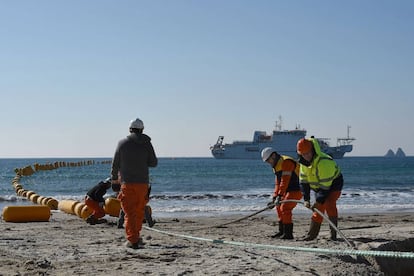Facebook and Microsoft to install “megacable” between Spain and US
The undersea connection will be managed by Telefónica affiliate Telxius, and will enter Europe through Bizkaia

Microsoft and Facebook have announced they are to lay a latest-generation submarine cable under the Atlantic to improve internet connections between the United States and Europe. The two giant tech companies say the cable will provide significantly faster online speeds, as well as better cloud computing services. Dubbed “Marea,” the cable will have a capacity of around 160 terabytes per second, 16 million times faster than a domestic connection, making the transatlantic cable the fastest broadband on the planet. Its eight pairs of fibers will connect the 6,600 kilometers between a North Virginia data center, and the Spanish province of Bizkaia, in the Basque Country, from where it will be distributed to other centers in Europe, Africa, the Middle East, and Asia.
The project will be operated by Telxius, a new infrastructure company set up by Spain’s leading telecoms operator, Telefónica, and that could invest in the company that owns the cable, say sources there.
Microsoft will use the new cable to improve its cloud-based services such as Azure, as well as Xbox, Skype and Office
The route taken by the cable begins further south than other transatlantic connections, which normally depart from New York. The new location will provide a more flexible and secure connection for customers in the United States and Europe and will give priority to Facebook and Microsoft services. Microsoft will use the new cable to improve its cloud-based services such as Azure, as well as Xbox, Skype and Office. Speaking on behalf of Facebook, Najam Ahmad, vice president of network technology, said his company “was always evaluating new technologies and systems to provide the best connectivity possible.”
The goal of both companies is to meet its customers’ growing and increasingly complex connection and data-consumption requirements, and to speed up the development of the latest generation of internet infrastructure. Marea will have open infrastructure, meaning it will be a cable that can operate using technology from a range of manufacturers. The design will mean cheaper costs for customers and better equipment, which could translate into the growth of broadband ratios by using fiber optics in the future. Construction of the cable will begin in August this year and is due to finish in October 2017.
Facebook and Microsoft are working with Telxius to benefit from Telefónica’s experience and know-how with underwater cables. The company will operate and manage the system and will be able to sell capacity as part of its wholesale infrastructure business. “Working with Facebook and Microsoft on this project will reinforce Telxius’ leadership and allow us to capture new market opportunities,” said Rafael Arranz, the company’s head of operations.
English version by Nick Lyne.
Tu suscripción se está usando en otro dispositivo
¿Quieres añadir otro usuario a tu suscripción?
Si continúas leyendo en este dispositivo, no se podrá leer en el otro.
FlechaTu suscripción se está usando en otro dispositivo y solo puedes acceder a EL PAÍS desde un dispositivo a la vez.
Si quieres compartir tu cuenta, cambia tu suscripción a la modalidad Premium, así podrás añadir otro usuario. Cada uno accederá con su propia cuenta de email, lo que os permitirá personalizar vuestra experiencia en EL PAÍS.
¿Tienes una suscripción de empresa? Accede aquí para contratar más cuentas.
En el caso de no saber quién está usando tu cuenta, te recomendamos cambiar tu contraseña aquí.
Si decides continuar compartiendo tu cuenta, este mensaje se mostrará en tu dispositivo y en el de la otra persona que está usando tu cuenta de forma indefinida, afectando a tu experiencia de lectura. Puedes consultar aquí los términos y condiciones de la suscripción digital.








































